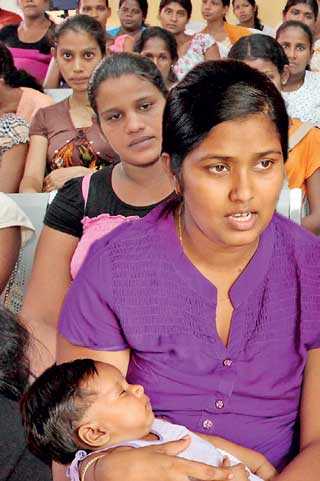Saturday Feb 21, 2026
Saturday Feb 21, 2026
Tuesday, 10 November 2020 00:44 - - {{hitsCtrl.values.hits}}
reliefweb.int: Women’s wellbeing could be measured by many aspects such as the access to decent employment, economic security, equal access to resources, political participation, decision making, health and personal safety.
Violence against women is one of the most pervasive human rights violations that impacts the progression and wellbeing of women and girls. This report focused on that aspect. With 52% of the population being women in Sri Lanka it is vital they are part of the development agenda. Global evidence highlights that when women have the freedom to make their own choices and decisions they are able to contribute more effectively to a country’s development process. Sri Lanka has taken many measures to promote gender equality and has achieved gender parity, or near parity, in education and health through the introduction of free health and education services. However, many challenges remain in addressing gender equality and ensuring that women and girls can have a life of dignity and respect.
According to the World Health Organisation (WHO), 35% of women worldwide have experienced physical and/or sexual intimate partner violence or non-partner sexual violence. Globally, almost one third (30%) of women who have been in a relationship have experienced some form of physical and/or sexual violence by their intimate partner in their lifetime.
Sri Lanka collected their first national data on the prevalence of violence against women as part of the 2016 Demographic and Health Survey (DHS). Using a limited number of questions in the domestic violence module, it found that rates of domestic violence by partners were a concern that needed further research through a dedicated survey. In 2019, the Department of Census and Statistics conducted the first dedicated national prevalence survey on violence against women, and the first using the WHO methodology. Known as the Women’s Wellbeing Survey (WWS) it covered all 25 districts in Sri Lanka and interviewed more than 2,200 women aged 15 and above. Field work took place between March and September 2019, collecting data through computer assisted personal interviews.
The survey revealed that women in Sri Lanka are more than twice as likely to have experienced physical violence by a partner (17.4% of all women experienced this in their lifetime) than by a non-partner (7.2% experienced this since age 15). Partner sexual violence is also more prevalent than non-partner sexual violence although the gap is not as large as for physical violence. 24.9% of women have experienced physical and/or sexual intimate partner violence or non-partner sexual violence. 18.8% of women who have been in a relationship have experienced some form of physical and/or sexual violence by their intimate partner in their lifetime.
This report presents the main findings on violence by partners, violence by non-partners, and the risk factors and impacts that violence by partners has on women in Sri Lanka.
To access the full report, please visit http://www.statistics.gov.lk/.